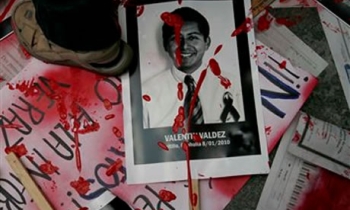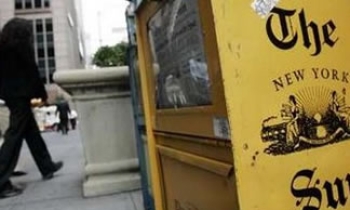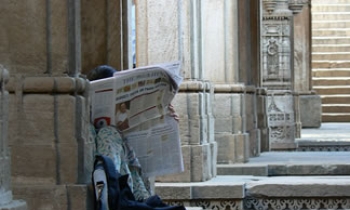NEW YORK: When Publisher Arthur Sulzberger Jr. first raised the question of a job change for Gail Collins in 2001, she was afraid he was going to fire her. "I was at a party and he was there," Collins, then an Op-Ed columnist, recalled. "He whipped around and said, 'do you like your job? Would you give it up?' "
The result, of course, was just the opposite. Instead of being fired, she was promoted, becoming the paper's first female editorial page editor and replacing Howell Raines, who went on to a short, tumultuous reign as executive editor.
For Collins, the appointment not only marked her most powerful post in a New York news career that has spanned three of the city's major papers during more than 20 years. But it also was the beginning of one of the most difficult periods for the Times opinion pages that included the Sept. 11 attacks, the Jayson Blair scandal and the recent anti-press siege that has seemed to target the Times more than any other.
"It has been a particularly intense period," Collins, 60, told E&P during an interview last week in her 10th floor Times office. "It told me what I never realized, how the rest of the world regards this paper and how the paper regards itself. How different it is from other places."
Sulzberger now credits Collins with managing the job that has grown well beyond what the editors before her had to tackle. "She is the one who has made it a success," he told E&P. "I am taken by the remarkable growth in what the editorial page does now."
Her biggest regret as opinion leader was not questioning the existence of weapons of mass destruction in Iraq prior to the war. While the editorial page has long opposed the invasion, due mostly to the lack of a U.N. authorization, it had supported the contention that WMD's existed early on.
"If I had to do it over again, I would have paid a lot more attention to the people on the board who had doubts," Collins said. "I thought there were weapons of mass destruction and most of the board members did. Frankly, we did not spend enough time debating the issue." She said that led to early editorials that proclaimed the existence as a matter of fact rather than a questionable assertion. "We should have argued among ourselves more," she stressed. "Given our readers some of a sense that there was an argument about it, we tended to take it for granted."
While she has had to learn to guide the heavily-watched opinion pages during traumatic events like the Blair scandal and the Iraq War, Collins says she has also learned that the paper is more than a daily news source for many, still seen as a real paper of record and stability. Noting one of the immediate reader reactions on Sept. 11, she recalled her department getting some 500 letters per hour during the first day or so after the attacks. "For a lot of people, the thing to do was send a letter to The New York Times," she says. "They just wanted to express their feelings."
Occurring slightly more than a month into her rookie tenure as top opinion editor, Sept. 11 marked the first real challenge for the new woman in charge. First hearing about the attacks in a cab on her way to the office from her upper east side home that morning, Collins says she quickly assembled the editorial board, tapping into their vast experience and expertise to create the next day's lengthy, lone editorial.
"As the whole thing unfolded, I realized I had two people who had covered the war in Afghanistan and another who was an expert on national security issues," she recalls while seated on a couch in a side office living room, which includes a small bar set-up. "It was an amazing support system."
Collins says she has since made a practice of allowing board members to drive the editorial discussions rather than directing them completely herself. "In a way, it doesn't matter who the editorial page editor is because you have so much to draw on," she said of the 18-person board, which is the largest ever at the paper. "Most people on the board were reporters who can find stuff out really, really fast."
But it is Collins who leads the troops and faces the scrutiny when the inevitable complaints come in from those who make the Times their punching bag as the epitome of what is wrong with "mainstream media" and "liberal media elites." That responsibility weighs heavy on Collins, she says, admitting that she has had doubts about decisions made in the powerful post.
"I have gone through periods in this job desperate not to make a mistake because there are so many people watching you," she revealed. "The paper is such a treasure for the country, [that feeling] is almost immobilizing."
But while she is willing to admit mistakes, Collins remains a fierce defender of the paper, be it editorial pages or news side. When asked about the recent Wall Street Journal editorial that slammed the Times' story revealing the federal government's Swift bank monitoring program, Collins called the criticism "stunning."
"On policy matters, editorial pages disagree all the time," she said. "But on matters like freedom of the press, in general people who go into this business have a shared vision of the responsibility of the press and of the First Amendment and their role in covering the day to day." She also said the Journal's criticism of its own paper's reporting of the same story was "just too weird."
But Collins says the biggest angst comes from those who continue to see the editorial page as leading the news side. "The biggest misconception is that we have an influence on the news page," she says. "People who don't know the paper have a vision that the columnists drive the paper. My favorite thing is to go out and explain to people how this paper operates and how important that wall is. "
While she admits the editorial page has a liberal bent, which goes back deep into its roots, she counters any assertion that it affects reporting. "It is a liberal editorial page that reflects core values the paper has had for a long time," she says. "But I would challenge anyone, if you look at our news reports on those big issues of the day -- tax policy, foreign affairs -- to say it is a liberal newspaper. It is objectivity they strive hard to do." She also contends the Op-Ed columns seek to bring "a wide range of discussion."
Still, the Times remains among the major news outlets that have come under fire regularly from alternative papers, blogs, and those who consistently bash the "mainstream media." While this does not surprise Collins, she says "It is just a bad time to be a mainstream institution in this country."
Surprisingly, however, her name is not the one normally raised by anti-Times critics. Publisher Sulzberger, Executive Editor Bill Keller, and the more well-known columnists such as Maureen Dowd or Thomas Friedman are more often the target of such slams, while Collins remains somewhat low-key. But that does not keep her from managing the department with a clear directive, staffers says.
"She is very respectful of the fact that the page is not hers, it is the newspaper's," said Andrew Rosenthal, deputy editorial page editor and son of former executive editor A.M. "Abe" Rosenthal. "She is not here to overturn decades of the paper."
Leading a visitor through the quiet, dark editorial board offices, which resemble a faculty wing of a major university more than a newspaper, Collins shows reverence for the paper as historic institution. Hands clasped behind her as she strolls past a photo gallery of her all-male predecessors, which include the likes of Max Frankel, she offers a quick history lesson about the paper's first editors -- Charles Miller and Henry Raymond, whose portraits hang in the board room. "They were the ones who spent most of their time writing about why women shouldn't vote," Collins says with a grin.
A 1967 graduate of Marquette University, Collins spent nearly a decade running a statewide news service in Fairfield County, Conn. before joining UPI in 1980, based in New York. In 1985, she went to the New York Daily News, working as a business writer and columnist before jumping to Newsday in 1990. She joined the Times in 1995 as a member of the editorial board, becoming a columnist in 1999, and editorial page editor two years later. She is married to Dan Collins, an author and senior editor at CBS News.
Before 9/11, Collins expected her biggest challenge in the new job to be coming up with interesting issues and approaches for the opinion section, which included just two pages each day back then. Now the paper boasts a three-page Sunday opinion section, as well as five regional weekend opinion pages and numerous online offerings - from TimesSelect to blogs to the paper's first-ever, Web-only columnist.
Along with the explosion in recent years of e-mail letters, which top 1,000 per day some weeks, Collins said the added regional editorial pages have put an additional burden of endorsing local candidates outside of New York on the board. "The greatest service you do is on the smaller races," she says of such endorsements. "When it comes down to city council and state legislature, it is a way more powerful voice."
Writing up to two editorials per week herself, Collins also oversees three editorial board meetings, as well as a weekly gathering of regional editorial board members. Then there is her standing lunch every Wednesday with Sulzberger, Keller and Times President Scott Heekin-Canedy, not to mention the frequent endorsement meetings with candidates and other guests, ranging from literary notables to community groups.
"I think I've had more impact in the people I've hired and the stuff I have encouraged them to do," she says. "You create your mark in part through the times that you live in."
She cited Raines' outspoken criticism of Bill Clinton in the 1990s as almost more difficult to pull off than her board's hits on George W. Bush. "The hardest thing for an editorial page is when you attack what your base readers believe in," she said. "Writing editorials that attacked Bill Clinton is harder than writing editorials that attack George Bush, you don't expect them."
Still, she says life under the Bush Administration also has its challenges. "We have a page that has been deeply upset and worried about him on the most profound issues of the day," she explains. "We are in a way different time."









